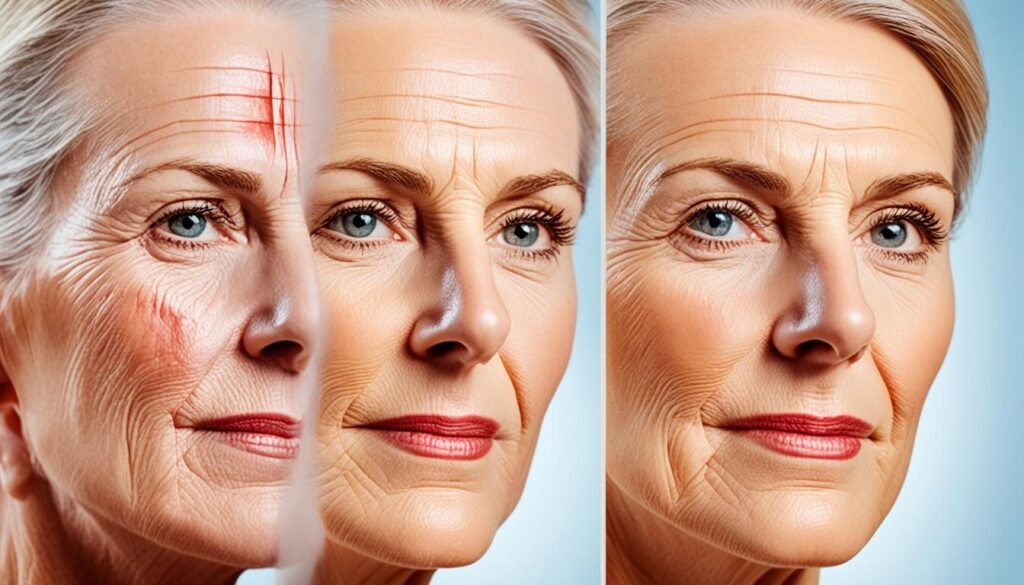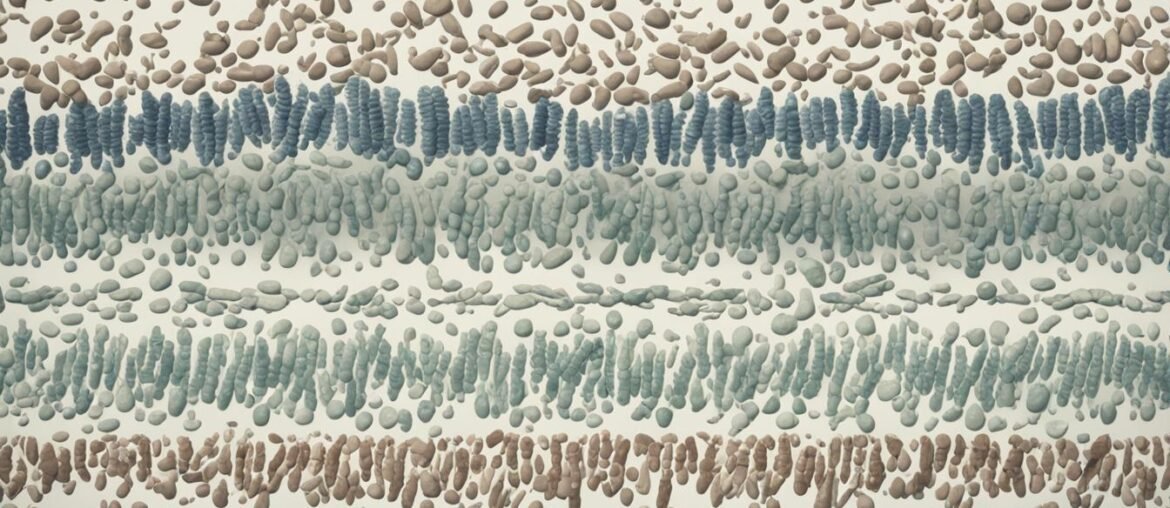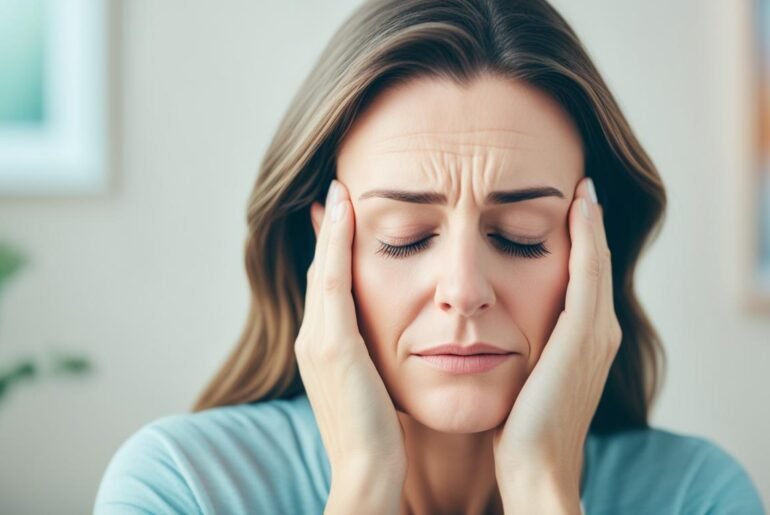Did you know that chronic stress can have a significant impact on the aging process of your skin? The effects of stress go beyond just mental and emotional well-being – they can actually manifest on your skin, leading to premature aging and the development of wrinkles, dullness, and other signs of aging.
Stress-induced skin aging is a real phenomenon that affects many individuals. The release of stress hormones such as cortisol and adrenaline triggers inflammation, damages DNA and cells, and disrupts normal cellular functioning. Long-term stress can also lead to oxidative stress, which damages cells, proteins, and DNA, accelerating the aging process.
In addition, chronic stress has been associated with shorter telomeres, the protective caps on the ends of chromosomes that naturally shorten with each cell division. Shorter telomeres are considered a marker of biological aging, suggesting that stress can accelerate the aging process at a cellular level.
But don’t worry – the aging effects of stress are reversible. Once the stress is removed and the body has a chance to recover, the skin can begin to repair itself and regain its youthful appearance.
Key Takeaways:
- Chronic stress can accelerate the aging process of the skin.
- Inflammation and oxidative stress caused by stress can damage cells, proteins, and DNA, leading to premature aging.
- Shorter telomeres, a result of chronic stress, are associated with accelerated biological aging.
- Managing stress and adopting stress reduction techniques can help slow down the skin aging process.
- The effects of stress on skin aging can be reversed once the stress is removed and the body has a chance to recover.
The Role of Telomeres in Stress-Induced Skin Aging
Telomeres, the protective caps on the ends of chromosomes, play a crucial role in the aging process of our skin. They naturally shorten with each cell division, serving as a marker of biological aging. When telomeres become critically short, cell division stops, leading to cellular senescence or cell death.
Chronic stress has been linked to shorter telomeres, suggesting an accelerated aging process. The chronic release of stress hormones, such as cortisol, can contribute to telomere dysfunction. This dysfunction can lead to metabolic and mitochondrial compromise, further exacerbating skin aging.
“Chronic stress can have a detrimental impact on telomeres, contributing to premature skin aging. Telomere dysfunction caused by stress disrupts the normal cellular response to stress and can lead to accelerated cellular aging,” says Dr. Anna Thompson, a renowned dermatologist.
Research, however, provides promising insights into the potential reversal of stress-induced telomere shortening. Once stress is removed and the body has a chance to recover, telomere length can be restored. This indicates that managing stress and promoting a healthy environment can potentially reverse the aging effects caused by chronic stress.
To better understand the relationship between telomeres and stress-induced skin aging, a recent study examined the effect of stress reduction techniques on telomere length. The study found that individuals who practiced regular stress management activities, such as mindfulness meditation and exercise, had longer telomeres compared to those with high-stress levels.
The Cellular Response to Stress and Telomeres
Stress can trigger a cascade of cellular responses aimed at protecting the body from harm. However, chronic or prolonged stress can disrupt these protective mechanisms and lead to telomere shortening.
Telomeres play a vital role in maintaining genomic stability and preserving the integrity of our DNA. They protect the chromosomes from being eroded or fused together, maintaining the overall structural stability of the cell.
When cells undergo stress, they respond by activating the cellular stress response pathways. Telomeres are critical in these stress response mechanisms, as they provide a protective buffer zone, preventing the loss of genetic material.
“Telomeres serve as a ‘buffer zone’ during cellular replication and stress. They act as sacrificial elements, allowing the chromosomes to replicate while protecting the vital genetic information,” explains Dr. Jessica Ramirez, a leading researcher in telomere biology.
However, chronic stress can disrupt the delicate balance of this protective system. Prolonged exposure to stress hormones and oxidative stress can accelerate telomere shortening and compromise the protective functions they provide.
The Potential Impact on Skin Aging
The link between telomeres and skin aging suggests that stress-induced telomere dysfunction may contribute to accelerated skin aging. As telomeres shorten, cells become more vulnerable to damage and senescence, resulting in decreased cellular function and compromised tissue regeneration.
“When telomeres become critically short, cells lose their ability to divide, leading to accelerated cellular aging. This can manifest externally as wrinkling, loss of elasticity, and other signs of premature skin aging,” explains Dr. Emily Roberts, a dermatology expert.
Furthermore, the compromised metabolic and mitochondrial function resulting from telomere dysfunction can further contribute to skin aging. Cellular energy production decreases, affecting vital processes such as collagen synthesis and tissue repair.
However, research suggests that the aging effects caused by stress-induced telomere dysfunction can be reversed. Once stress is managed and reduced, telomeres have the potential to regain their length and restore cellular function.
| Telomere Length and Stress | Telomere Length Restoration |
|---|---|
| Chronic stress linked to shorter telomeres | Managing stress can potentially reverse telomere shortening |
| Telomere dysfunction compromises cellular function | Reduced stress levels promote telomere length restoration |
| Accelerated skin aging due to stress-induced telomere dysfunction | Stress management can help restore cellular vitality and slow down skin aging |
Understanding the role of telomeres in stress-induced skin aging provides valuable insights into the potential for intervention. By managing stress levels and promoting a healthy lifestyle, individuals can help protect their telomeres and maintain youthful skin.
The Impact of Stress Hormones on Skin Aging
Stress hormones play a significant role in the aging process of the skin. Cortisol, often referred to as the “stress hormone,” and adrenaline, released during times of stress, can have detrimental effects on skin health.
Cortisol and Skin Aging
Cortisol, the primary stress hormone, can impair collagen production, leading to the breakdown of collagen and elastin in the skin. Collagen and elastin are essential for maintaining skin elasticity and preventing wrinkles. The excessive production of cortisol due to chronic stress can accelerate the aging process, resulting in the formation of fine lines, wrinkles, and sagging skin. It can also delay the wound healing process and contribute to delayed skin repair.
Adrenaline and Skin Aging
Adrenaline, also known as the “fight or flight” hormone, is released during stressful situations. One of its effects is vasoconstriction, which reduces blood flow to the skin. This reduction in blood flow can lead to dullness and an aged appearance. Adequate blood flow is crucial for delivering oxygen and nutrients to the skin cells, promoting a healthy, vibrant complexion. Additionally, reduced blood flow can impede the skin’s ability to eliminate toxins and waste, further contributing to skin aging.
“The increased production of cortisol and adrenaline during times of stress can have profound effects on the skin. These stress hormones can disrupt the natural processes that maintain a youthful complexion, leading to premature aging.”
Minimizing the release of stress hormones is crucial for slowing down the skin aging process. Implementing stress management techniques and lifestyle changes can help mitigate the negative effects of cortisol and adrenaline on the skin.
| Stress Hormones | Effects on Skin Aging |
|---|---|
| Cortisol | Impairs collagen production, leading to wrinkles and sagging skin |
| Adrenaline | Reduces blood flow, resulting in dullness and an aged appearance |
By managing stress levels through techniques such as meditation, exercise, and self-care activities, individuals can help minimize the impact of stress hormones on skin aging. Taking proactive steps to reduce stress not only benefits the skin but also contributes to overall well-being.
The Role of Inflammation in Stress-Related Skin Aging

Chronic stress can have detrimental effects on skin health, contributing to the aging process. One of the key mechanisms through which stress affects the skin is inflammation. Inflammation is the body’s natural response to injury or infection, but when triggered by chronic stress, it can lead to skin aging.
Inflammatory signaling molecules, such as cytokines, are released in response to stress and can disrupt the normal functioning of skin cells. These molecules can cause the breakdown of collagen and elastin, essential proteins that maintain the skin’s structure and elasticity. As a result, the skin may become less firm and more prone to wrinkles.
Moreover, chronic stress is often accompanied by oxidative stress, which is characterized by an imbalance between antioxidants and harmful free radicals. Oxidative stress can directly damage cells, proteins, and DNA, accelerating the aging process. Over time, this damage can manifest as fine lines, wrinkles, and other common signs of aging.
To mitigate the effects of stress-related inflammation and oxidative stress on skin aging, it is crucial to manage stress levels and reduce inflammation. This can be achieved through several lifestyle changes and skincare practices:
- Engaging in stress-reducing activities such as meditation, deep breathing, or yoga
- Getting regular exercise to promote blood circulation and reduce inflammation
- Following a healthy diet rich in antioxidants to counteract oxidative stress
- Using skincare products with anti-inflammatory ingredients like green tea extract or niacinamide
- Protecting the skin from sun damage with broad-spectrum sunscreen
By actively managing stress and reducing inflammation, individuals can help slow down the skin aging process caused by chronic stress. Taking care of both mind and skin is essential for maintaining a youthful and healthy appearance.
Reference:
“Chronic stress may accelerate aging process.” University of California, San Francisco.
The Link Between Stress and Skin Conditions
Chronic stress can have a significant impact on various skin conditions, exacerbating symptoms and flare-ups. Conditions such as acne, eczema, and psoriasis are particularly susceptible to the effects of stress. Stress-induced inflammation and hormonal imbalances can contribute to the worsening of these conditions, leading to increased discomfort and frustration for those affected.
When stress levels are high, the body releases stress hormones such as cortisol, which can trigger inflammation and disturb the balance of the skin. This can result in acne breakouts, increased itchiness and dryness in eczema, and the development of psoriasis plaques.
To manage stress-related skin conditions, it is crucial to adopt effective stress-reducing techniques and prioritize stress management. By minimizing stress levels, individuals may experience a reduction in the severity and frequency of flare-ups, along with an improvement in overall skin health.
“Chronic stress can impact the skin in numerous ways, exacerbating existing skin conditions and presenting new challenges. By managing stress effectively, individuals can better support their skin’s health and minimize the impact of stress on these conditions.”
Stress and Acne
Stress has been found to play a significant role in the development and aggravation of acne. When stress levels are high, the body increases its production of cortisol, which stimulates the sebaceous glands to produce more oil. Excess oil production, combined with the buildup of dead skin cells and bacteria, can lead to clogged pores and the formation of acne lesions. Additionally, stress-induced inflammation can worsen the redness and swelling associated with acne.
Stress and Eczema
Eczema, a chronic inflammatory skin condition, can be triggered or worsened by stress. Emotional stress can disrupt the skin’s barrier function, leading to increased moisture loss, dryness, and an intensified immune response. The resulting inflammation can cause flare-ups of eczema, characterized by redness, itchiness, and skin irritation.
Stress and Psoriasis
Psoriasis, an autoimmune skin condition, is known to be influenced by stress. The body’s immune system mistakenly attacks healthy skin cells, leading to the rapid overproduction of new skin cells. Stress can trigger or worsen psoriasis flare-ups by creating an imbalance in the immune system and promoting inflammation. This can result in the formation of thick, red, and scaly patches on the skin.
By prioritizing stress reduction techniques and incorporating stress management strategies into daily life, individuals can take proactive steps to alleviate the impact of stress on their skin conditions. Embracing practices such as mindfulness, exercise, and self-care can contribute to improved overall well-being and healthier skin.
| Skin Condition | Effects of Stress |
|---|---|
| Acne | Increased oil production, clogged pores, inflammation |
| Eczema | Disrupted barrier function, moisture loss, inflammation |
| Psoriasis | Immune system imbalance, rapid skin cell turnover, inflammation |
The Importance of Stress Management for Skin Aging

Stress management techniques are essential for maintaining youthful looking skin. Stress has been linked to various skin aging effects, including wrinkles, dullness, and loss of elasticity. By adopting stress reduction strategies and incorporating mindfulness practices into your daily routine, you can effectively manage stress levels and minimize its impact on your skin’s health and appearance.
Mindfulness meditation is a powerful stress management technique that involves focusing your attention on the present moment. By practicing mindfulness, you can reduce stress and promote a sense of relaxation, which can have a positive impact on your skin. Allocate a few minutes each day for mindful breathing exercises or guided meditation to help calm your mind and rejuvenate your skin.
Regular exercise is another effective stress management technique that can benefit your skin. Engaging in physical activities, such as jogging, yoga, or dancing, helps release endorphins, also known as “feel-good” hormones. These endorphins can counteract the negative effects of stress hormones on the skin, promoting a healthier and more youthful appearance.
Adequate sleep is crucial for stress reduction and optimal skin health. During sleep, your body repairs and regenerates cells, including those responsible for maintaining healthy skin. Aim for at least 7-8 hours of quality sleep each night to support your skin’s natural rejuvenation process and minimize the signs of aging caused by stress.
Remember to prioritize self-care activities that bring you joy and relaxation. Engaging in activities you love, whether it’s reading a book, taking a warm bath, or spending time in nature, can help reduce stress levels and contribute to overall skin health. Making time for these activities is not only beneficial for your well-being but also for maintaining youthful-looking skin.
The Mind-Body Connection
It’s important to recognize the strong connection between the mind and body when it comes to skin aging. Stress not only affects your mental and emotional well-being but also has a direct impact on your skin’s health and appearance. By adopting stress management techniques and prioritizing self-care, you can promote a harmonious mind-body connection and slow down the aging process.
Take control of your stress and embrace stress reduction techniques to nurture both your inner well-being and your skin’s health. Incorporate mindfulness practices, exercise regularly, prioritize quality sleep, and engage in activities that bring you joy and relaxation. By practicing stress management, you can maintain youthful and vibrant-looking skin for years to come.
The Impact of Lifestyle Factors on Skin Aging
Lifestyle factors play a crucial role in determining the aging process of the skin. Certain habits and choices can either contribute to or mitigate skin aging. Let’s explore how healthy diet, exercise, sleep, smoking, and alcohol consumption can impact the health and appearance of our skin.
Healthy Diet and Skin Aging
A healthy diet rich in antioxidants and essential nutrients is essential for maintaining youthful skin. Antioxidants help combat oxidative stress, a major contributor to skin aging. Incorporating foods like berries, leafy greens, nuts, and fatty fish into your diet can provide your skin with the necessary nutrients and protect it from environmental damage.
| Nutrient | Sources |
|---|---|
| Vitamin C | Citrus fruits, kiwi, strawberries |
| Vitamin E | Almonds, sunflower seeds, spinach |
| Omega-3 fatty acids | Fatty fish, chia seeds, walnuts |
Exercise and Skin Aging
Regular exercise not only improves overall health but also benefits the skin. Exercise promotes blood circulation, delivering oxygen and nutrients to the skin cells. This increased circulation helps rejuvenate the skin and maintain its elasticity, thereby combating the signs of aging.
Sleep and Skin Aging
Quality sleep plays a vital role in the skin’s repair and regeneration process. During sleep, the body produces collagen, a protein that gives the skin its firmness and elasticity. Insufficient sleep can lead to increased stress hormones, exacerbating skin aging. Ensure you get 7-9 hours of uninterrupted sleep every night for optimal skin health.
Smoking and Skin Aging
Smoking is a significant contributor to premature skin aging. The chemicals in cigarettes damage collagen and elastin fibers, making the skin susceptible to sagging, wrinkles, and a dull complexion. Quitting smoking is crucial for not only your overall health but also for maintaining youthful-looking skin.
Alcohol and Skin Aging
Excessive alcohol consumption can have detrimental effects on the skin. Alcohol dehydrates the body, leading to dryness and dullness of the skin. It can also dilate blood vessels, causing redness and inflammation. Moderation is key when it comes to alcohol consumption to preserve skin health.
Incorporating a healthy diet, regular exercise, quality sleep, and minimizing smoking and alcohol consumption can help slow down the skin aging process and preserve a youthful appearance.
The Role of Personal Joy and Relaxation in Skin Aging

Engaging in activities that bring personal joy and relaxation can have a transformative effect on skin aging. When we experience personal joy, our bodies release endorphins, which are known as “feel-good” hormones. These endorphins activate the vagus nerve, a major component of the parasympathetic nervous system that promotes rest, relaxation, and repair.
One enjoyable activity that can be beneficial for both the mind and skin is singing. Singing has been found to increase heart rate variability, a measure of the body’s ability to adapt to stress. This helps to regulate stress responses and reduce the negative impact of stress on the skin. Dancing is another great way to find personal joy and relaxation. It combines physical activity with music, stimulating the release of endorphins and promoting overall well-being.
Incorporating walking into your daily routine can also contribute to skin health. Walking not only provides physical exercise but also offers an opportunity for mindfulness and stress reduction. Stepping outdoors into nature and enjoying the sights and sounds can be incredibly rejuvenating for the mind and skin.
“Walking in nature is like bathing in beauty. It allows us to reconnect with ourselves and find inner peace, which ultimately reflects on our skin.”
— Dr. Lily Chen, Dermatologist
Activities for Stress Reduction
Here are some activities that can help reduce stress and promote personal joy and relaxation:
- Reading a favorite book or listening to uplifting music
- Engaging in creative hobbies like painting, writing, or knitting
- Practicing yoga or meditation to calm the mind and body
- Spending quality time with loved ones or pets
- Engaging in aromatherapy with soothing scents like lavender or chamomile
Remember, finding personal joy and relaxation is a key component of managing stress and promoting skin health. By taking time for activities that bring you happiness, you can reduce the impact of stress on your skin and embrace a more youthful appearance.
| Activity | Description |
|---|---|
| Singing | Release endorphins and activate the vagus nerve, promoting relaxation and reducing stress effects on the skin. |
| Dancing | Combines physical activity, music, and joy to stimulate endorphin release and support overall well-being. |
| Walking | Offers physical exercise, mindfulness, and a connection with nature to reduce stress and rejuvenate the mind and skin. |
| Reading | Allows for mental escape, relaxation, and an opportunity to indulge in personal interests. |
| Yoga or Meditation | Promotes calmness, reduces stress, and improves overall well-being. |
The Cumulative Effects of Stress on Aging

Cumulative stress, particularly chronic emotional stress, has a profound impact on the aging process. Numerous studies have shown that increased cumulative stress is associated with accelerated aging and the development of age-related conditions.
Emotional stress, in particular, can take a toll on the skin and contribute to premature aging. The constant activation of the body’s stress response system releases stress hormones like cortisol, which can impair collagen production and lead to the breakdown of collagen and elastin, resulting in wrinkles and sagging skin.
Chronic stress also contributes to inflammation, oxidative stress, and telomere shortening, all of which are significant factors in the aging process. Inflammatory signaling molecules disrupt the normal functioning of skin cells, further contributing to the breakdown of essential structural components like collagen and elastin. Oxidative stress, associated with chronic inflammation, can damage cells, proteins, and DNA, accelerating the aging process.
“Long-term exposure to chronic stress can have a compounding effect on the aging process, leaving the skin more vulnerable to premature aging and various age-related conditions. It is crucial to implement strategies to counteract the cumulative effects of stress and maintain youthful skin.”
Effectively managing stress and implementing stress reduction strategies can significantly mitigate the cumulative impact of stress on skin aging. Techniques such as mindfulness meditation, deep breathing exercises, and engaging in enjoyable activities can help regulate emotions and promote relaxation, aiding in stress reduction and the preservation of skin health.
The Role of Emotional Regulation Techniques
Emotional regulation techniques play a vital role in combating the effects of cumulative stress on aging. By learning to manage emotions effectively, individuals can reduce the physiological and psychological impact of stress and decrease the risk of accelerated aging. Strategies like cognitive reappraisal, mindfulness, and journaling can help individuals gain control over their emotional responses and minimize the detrimental effects of chronic stress on the skin.
Implementing Stress Reduction Strategies
Implementing stress reduction strategies is essential to counteract the cumulative effects of stress on skin aging. Techniques such as regular exercise, adequate sleep, maintaining a healthy diet, and seeking social support can all help manage stress levels and promote overall well-being. Engaging in activities that bring joy, relaxation, and a sense of fulfillment can also contribute to youthful skin and a more vibrant appearance.
| Strategies to Counteract Cumulative Stress on Aging |
|---|
| Practice regular exercise |
| Get adequate sleep |
| Maintain a healthy diet |
| Cultivate social support |
| Engage in stress-reducing activities |
| Implement emotional regulation techniques |
By effectively managing stress and implementing stress reduction strategies, individuals can slow down the aging process and maintain youthful, radiant skin. Taking proactive steps to counteract cumulative stress not only facilitates healthier skin but also enhances overall well-being and quality of life.
The Relationship Between Stress and Biological Age

Stress has a profound impact on our biological age, influencing the rate at which our bodies age. Chronic stress, in particular, can accelerate the aging process and increase our biological age. However, emerging research suggests that once we effectively manage and reduce stress, we can reverse this aging process and restore our biological age to its optimal state.
Short-term fluctuations in biological age have also been observed, highlighting our body’s remarkable ability to recover and restore normal functioning when stress is properly addressed. This underscores the importance of actively managing our stress levels to maintain a more youthful biological age.
By implementing stress reduction techniques and adopting a holistic approach to stress management, we can mitigate the negative effects of stress on our biological age and overall well-being. Prioritizing self-care activities, engaging in relaxation techniques, and creating a healthy work-life balance are key strategies to consider.
The Impact of Stress on Biological Age
Chronic stress disrupts the body’s natural equilibrium, leading to a cascade of physiological changes that affect our biological age. Elevated stress hormones, such as cortisol, can contribute to inflammation, oxidative stress, and cellular damage, hastening the aging process.
Furthermore, chronic stress may affect the length of telomeres, the protective caps at the end of our chromosomes that shorten as we age. Studies have shown that shorter telomeres are associated with an increased biological age, indicating a link between stress and accelerated aging.
However, stress-induced changes in biological age can be reversed. Once stress is effectively managed and reduced, our bodies have the remarkable capacity to repair and restore normal functioning, allowing us to reclaim a more youthful biological age.
The Importance of Stress Management for Optimal Aging
Effectively managing stress is essential for maintaining optimal aging and well-being. By reducing chronic stress and implementing stress reduction techniques, we can support our cells, tissues, and organs to function optimally, slowing down the aging process.
It is also important to note that stress does not affect everyone in the same way. The impact of stress on biological age can vary among individuals, depending on their resilience, coping mechanisms, and overall health. However, regardless of our individual differences, actively managing stress is vital for promoting healthy aging and preserving a more youthful biological age.
| Effects of Stress on Biological Age | Strategies for Stress Management |
|---|---|
| Acceleration of aging process | Practicing mindfulness meditation |
| Inflammation and oxidative stress | Engaging in regular exercise |
| Poor cellular repair and regeneration | Getting enough quality sleep |
| Shortened telomere length | Adopting stress reduction techniques |
| Increased biological age | Prioritizing self-care activities |
By incorporating these stress management strategies into our daily lives, we can support our well-being, improve our overall health, and preserve a more youthful biological age. Managing stress is not only essential for the health of our skin, but also for our overall longevity and quality of life.
Conclusion
Managing stress is crucial for maintaining healthy and youthful skin. Chronic stress can hasten the aging process, resulting in the appearance of wrinkles, dullness, and other premature signs of aging. However, studies have shown that stress-induced skin aging can be reversed through effective stress management and positive lifestyle changes.
By adopting stress reduction techniques, such as mindfulness meditation and regular exercise, individuals can minimize the impact of stress on their skin. Engaging in activities that bring personal joy and relaxation can also contribute to overall well-being and promote a more youthful appearance.
It is important to recognize that managing stress is not only beneficial for skin health but also for the overall well-being of an individual. By prioritizing stress reduction and making conscious efforts to care for their mental and emotional states, individuals can slow down the aging process and maintain a vibrant and youthful complexion.
FAQ
How does stress accelerate skin aging?
Chronic stress triggers the release of stress hormones such as cortisol and adrenaline, leading to inflammation and damage to DNA and cells. Long-term stress can cause oxidative stress, which can damage cells, proteins, and DNA, accelerating the aging process. Chronic stress has also been associated with shorter telomeres, which can contribute to premature aging. However, the aging effects of stress can be reversed once the stress is removed and the body has a chance to recover.
What is the role of telomeres in stress-induced skin aging?
Telomeres, the protective caps on the ends of chromosomes, naturally shorten with each cell division and are considered a marker of biological aging. Chronic stress has been linked to shorter telomeres, suggesting an accelerated aging process. Telomere dysfunction caused by stress can lead to metabolic and mitochondrial compromise, further contributing to skin aging. However, research shows that once the stress is removed, telomere length can be restored, indicating the potential for reversing stress-induced skin aging.
How do stress hormones impact skin aging?
Stress hormones like cortisol and adrenaline can have detrimental effects on the skin. Cortisol, often referred to as the “stress hormone,” can impair collagen production and contribute to the breakdown of collagen and elastin, leading to wrinkles and sagging skin. Adrenaline, released during times of stress, can cause vasoconstriction and reduce blood flow to the skin, leading to dullness and an aged appearance. Managing stress and minimizing the release of these hormones can help slow down the skin aging process.
Chronic stress can trigger inflammation in the body, which can contribute to skin aging. Inflammatory signaling molecules, such as cytokines, can disrupt the normal functioning of skin cells and lead to the breakdown of collagen and elastin. Oxidative stress, often associated with inflammation, can also damage cells, proteins, and DNA, accelerating the aging process. Managing stress and reducing inflammation through lifestyle changes and skincare can help mitigate the effects of stress on skin aging.
How does stress affect skin conditions?
Chronic stress can aggravate existing skin conditions such as acne, eczema, and psoriasis. Stress-induced inflammation and hormonal imbalances can contribute to flare-ups and worsen symptoms. Managing stress and adopting stress-reducing techniques can help alleviate skin conditions and improve the overall health of the skin.
Why is stress management important for skin aging?
Stress management plays a crucial role in maintaining youthful skin. Adopting stress reduction techniques such as mindfulness meditation, regular exercise, and adequate sleep can help manage stress levels and minimize the impact on the skin. Taking time for self-care activities and engaging in activities that bring joy and relaxation can also contribute to overall skin health and slow down the aging process.
How do lifestyle factors influence skin aging?
Lifestyle factors can significantly influence the aging process of the skin. A healthy diet rich in antioxidants and nutrients can support skin health and minimize the impact of stress on aging. Regular exercise promotes blood circulation and helps maintain skin elasticity. Quality sleep is essential for cellular repair and regeneration. On the other hand, smoking and excessive alcohol consumption can accelerate skin aging and negate the benefits of stress management.
What is the role of personal joy and relaxation in skin aging?
Engaging in activities that bring personal joy and relaxation can have a positive impact on skin aging. Joyful activities can activate the vagus nerve, which can help the body rest, relax, and repair. Singing, dancing, walking, and other enjoyable activities can help mitigate the effects of stress on the skin and promote a more youthful appearance.
What are the cumulative effects of stress on skin aging?
Cumulative stress, especially chronic emotional stress, can have a significant impact on the aging process. Studies have shown that increased cumulative stress is associated with accelerated aging and the development of age-related conditions. Emotional regulation techniques and stress reduction strategies can help counteract the cumulative effects of stress on skin aging.
How does stress affect biological age?
Stress has been shown to have a significant impact on biological age. Chronic stress can lead to an increase in biological age, but research indicates that this aging process can be reversed once the stress is removed. Short-term fluctuations in biological age have been observed, highlighting the body’s ability to recover and restore normal functioning once stress is managed and reduced.
Is stress management important for skin health?
Yes, stress management is essential for maintaining skin health. Chronic stress can accelerate the aging process of the skin, leading to the development of wrinkles, dullness, and other signs of premature aging. However, research suggests that stress-induced skin aging can be reversed through stress management and lifestyle changes. Adopting stress reduction techniques, engaging in joyful activities, and taking care of overall health can help slow down the aging process and maintain youthful skin.




